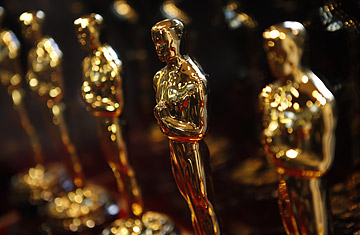
Oscar statuettes are displayed at the "Meet the Oscars, Chicago" event on Feb. 13, 2009
(2 of 2)
Yet that's what you get on Oscar night: five names, one winner, four losers; then it's move on, dot, yawn. What if we learned, as the tally was shown on a big board behind the person reading out the nominations for Best Actor, what the names of the top two contenders were — and that they were just one vote apart? That actually happened in 1932, and the Oscar was given to both Fredric March and Wallace Beery. But we know that only because the Academy later changed the rule: to declare a tie, the tallies had to be exactly even. We also know that, in 1969, Katharine Hepburn and Barbra Streisand got the same number of votes for Best Actress — because they both were named winners. (There were also ties in three "minor" categories that had far fewer voters.)
What else do we know about the Oscar tallies? Nothing. Did Greta Garbo or Cary Grant or Alfred Hitchcock, to pick three distinguished artists who never got competitive Oscars, ever come close to winning? If Kate Winslet takes Best Actress this year, did Meryl Streep lose by just a handful of votes, or was it a wipeout? The five previous times Winslet was a runner-up, or the past 10 times when Streep was nominated but not called to the stage, was either star even within shouting distance? Which races were runaways over Oscar's 80 years, and which were photo finishes? Wouldn't you like to know? Wouldn't the show have a little more interest if you did?
Making the vote tabulation public would also invigorate the weeks before the Oscar show. So-called experts give odds on the nominees in top categories, but the knowledge that only the winner will be revealed renders that exercise useless; now it'd mean something. And all those office Oscar pools could promote, in addition to the winners, any number of beguiling side bets. Who can pick the top five in the most categories — in order? How many votes will separate Sean Penn from Mickey Rourke? Does The Curious Case of Benjamin Button, seemingly left in the dust by Slumdog Millionaire, get three points for home-field advantage? What's the over-under on Melissa Leo?
I'd also like the Academy to reveal the votes that went into the nominations. The top five are announced; let's hear the top 10. That would have told us exactly where The Dark Knight finished. And whether Clint Eastwood's Gran Torino got anywhere near the top five for Picture, Actor or Director. Another thing: this year it's entirely possible that Kate Winslet finished in the Best Actress top five for two performances — one in The Reader, the other in Revolutionary Road — but was named only for the first because that role earned her more votes and the Academy doesn't allow the same name to appear twice in an acting category. If that had happened, we should have heard about it on nominations morning.
A Sunshine Law for Movies
But we didn't. And we won't. And all because the Academy members value secrecy in the process above the public's interest in their product. What are they hiding — state secrets? Oh, that's right: in our society you can't hide a lot of secrets. In the past 40 years, through the Freedom of Information Act, concerned citizens have unearthed documents whose publication resulted in the banning of Red Dye #2, the recalling of the Ford Pinto, the revelation that Agent Orange was used on Vietnamese civilians and the resignation of Vice President Spiro Agnew.
We need a Freedom of Infotainment Act. The Star Chamber of the Motion Picture Academy must be compelled to open its books and make the results public. At least confirm to us that in 1993, the Supporting Actress Oscar really did go to Marisa Tomei. Show us the data! Let the sunshine in.
As long as the particulars of Academy voting are suppressed, we movie lovers will find Oscar night less exciting as we watch it, less likely to lodge in our collective memory. ("Hey, remember how close that Best Actor race was in 2009?") Hollywood is supposed to be the best at creating drama, suspense, thrills — at putting on a great show. If we knew not only who the winners were but by how much they won, the Oscar show could be the Super Bowl of movies.
